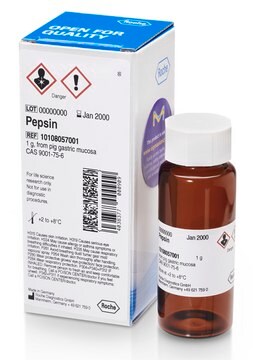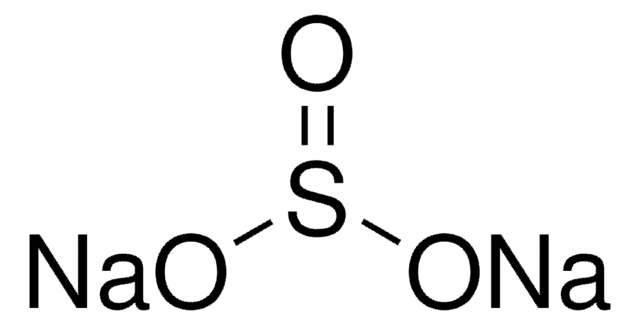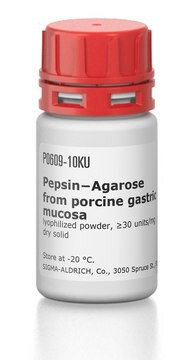77161
Pepsina from porcine gastric mucosa
tested according to Ph. Eur.
Sinónimos:
Pepsina A, Pepsina from hog stomach
Iniciar sesiónpara Ver la Fijación de precios por contrato y de la organización
About This Item
Productos recomendados
Agency
USP/NF
tested according to Ph. Eur.
Formulario
powder
mol peso
35 kDa
Nº de acceso UniProt
temp. de almacenamiento
2-8°C
Información sobre el gen
pig ... LOC396892(396892)
¿Está buscando productos similares? Visita Guía de comparación de productos
Categorías relacionadas
Aplicación
Puede utilizarse hidrólisis con pepsina para producir los fragmentos F(ab′)2 de los anticuerpos. pepsina en www.sigma-aldrich.com/enzymeexplorer
Acciones bioquímicas o fisiológicas
Escisión preferente: residuos hidrófobos y aromáticos en las posiciones P1 y P1′. Rompe los enlaces Phe-Val, Gln-His, Glu-Ala, Ala-Leu, Leu-Tyr, Tyr-Leu, Gly-Phe, Phe-Phe y Phe-Tyr en la cadena β de la insulina
Nota de análisis
pH óptimo es 2-4. Activa en urea 4 M y HCl de guanidina 3 M. Estable a 60 ºC. La pepsina se desactiva de manera irreversible a pH 8,0 - 8,5.
Cláusula de descargo de responsabilidad
Sales restrictions may apply.
Palabra de señalización
Danger
Frases de peligro
Consejos de prudencia
Clasificaciones de peligro
Eye Irrit. 2 - Resp. Sens. 1 - Skin Irrit. 2 - STOT SE 3
Órganos de actuación
Respiratory system
Código de clase de almacenamiento
11 - Combustible Solids
Clase de riesgo para el agua (WGK)
WGK 1
Punto de inflamabilidad (°F)
Not applicable
Punto de inflamabilidad (°C)
Not applicable
Equipo de protección personal
dust mask type N95 (US), Eyeshields, Faceshields, Gloves
Elija entre una de las versiones más recientes:
¿Ya tiene este producto?
Encuentre la documentación para los productos que ha comprado recientemente en la Biblioteca de documentos.
Los clientes también vieron
Heather H Pua et al.
Cell reports, 26(4), 933-944 (2019-01-24)
Extracellular RNAs (exRNAs) can be released by numerous cell types in vitro, are often protected within vesicles, and can modify recipient cell function. To determine how the composition and cellular sources of exRNAs and the extracellular vesicles (EVs) that carry them
Liqing Zhou et al.
Behavioural brain research, 364, 374-382 (2018-01-18)
Accumulating evidence supports an increase in emotional and behavioral problems in patients with food allergy, but the underlying mechanism remains poorly understood. Here we found that in addition to inducing an increase of allergic factors in serum, food allergy also
Haiyu Qi et al.
Cell reports, 31(6), 107621-107621 (2020-05-14)
Follicular helper T cells (Tfhs) are essential for germinal center (GC) B cell maturation and antibody development. However, the intrinsic mechanisms that regulate Tfh differentiation are largely unknown. Here, we demonstrate that the frequencies of Tfhs and GC B cells, as
Xinghui Li et al.
Immunity, 50(3), 576-590 (2019-02-17)
Elevated glucose metabolism in immune cells represents a hallmark feature of many inflammatory diseases, such as sepsis. However, the role of individual glucose metabolic pathways during immune cell activation and inflammation remains incompletely understood. Here, we demonstrate a previously unrecognized
Chuan-Hsiao Han et al.
Food chemistry, 138(2-3), 923-930 (2013-02-16)
Our previous report showed that yam dioscorin and its peptic hydrolysates exhibit radical scavenging activities; however, the functions of these peptic hydrolases are still under investigation. In this study, the thiol-containing peptides derived from computer-aided simulation of pepsin hydrolysis of
Nuestro equipo de científicos tiene experiencia en todas las áreas de investigación: Ciencias de la vida, Ciencia de los materiales, Síntesis química, Cromatografía, Analítica y muchas otras.
Póngase en contacto con el Servicio técnico










